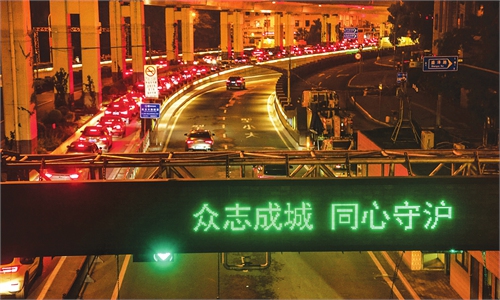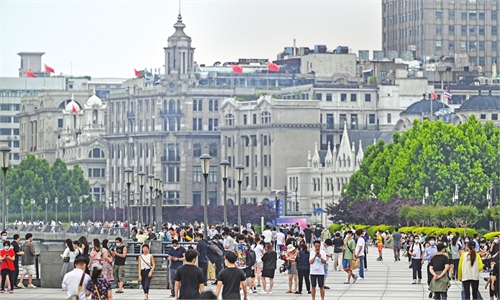
The Plaza 66 shopping mall on Nanjing road in Shanghai resumed business on June 1. The flow of people has increased and there are long queues in front of some luxury stores. Photo: Chen Xia/GT
Even as Shanghai ended a two-month lockdown and reopened on Wednesday, the city remained on high alert and maintained certain anti-epidemic measures to prevent a resurgence of COVID-19 infections, while experts stressing that effective, normalized monitoring of the virus is crucial to detect new cases early so as to prevent new outbreaks.
On Wednesday, Shanghai reported five confirmed cases and ten silent virus carriers for Tuesday, underscoring the lingering risk of COVID-19. And Shanghai is not taking any chances.
On the streets of Shanghai, while the relaxing atmosphere is palpable, as local residents embraced the hard-earned return of normal life after two-month lockdown, signs of epidemic were also ubiquitous.
On Anfu Street, as people were visiting stores, drinking coffee and taking photos on the streets - and children were playing outside, shop assistants were still cleaning and disinfecting their shops to prepare for reopening.
Residents also consciously checked their temperature, scanned health code and disinfected their hands with no-wash sanitizers, before entering stores and shopping malls. Lines were also witnessed at nucleic acid testing spots on the streets.
The task of reducing new infections and preventing a resurgence remains tough, Zong Ming, deputy mayor of Shanghai, said at a press conference on Tuesday, noting that there were still 200,000 people in Shanghai living in areas under epidemic control measures and about 22 million living in areas under preventative measures.
While seeing others in the city celebrating the reopening, those still living under control measures expressed patience.
A resident surnamed Wang in a controlled community in Jing'an district told the Global Times that the community had informed them that they had to continue to abide by management rules. "But we do not feel bad. As the whole city has been reopened, it would not be long before our reopening day," Wang said.
Meanwhile, heath experts stressed that it is not the time for Shanghai to let the guards down against the virus.
The preventative measures during normal anti-epidemic monitoring have to be implemented accurately, Lu Hongzhou, head of Shenzhen's anti-epidemic expert team and head of the Third People's Hospital of Shenzhen, told the Global Times.
Lu said that regular nucleic acid testing should be conducted to find out cluster infections and prevent resurgence, while the requirement for health code scanning before entering any public places would encourage residents to conduct the testing regularly.
Residents in Shanghai now need a 72-hour valid negative nucleic test before entering public venues and taking public transportation. The government also put a cap of 75 percent of the maximum capacity on commercial sites, including shopping malls.
The incubation period of the Omicron variant is 2-3 days, so it is enough to test the public every three days even under the strictest condition, Lu said, noting that in areas where no infections have been reported in two incubation periods, residents should be allowed to return to their normal lives.
While stressing that Shanghai's reopening as a hard-earned achievement, Chen Xi, an associate professor of public health at Yale University, also called for more efficient nucleic acid testing, pointing to the growing speed of virus transmission and increasing ratio of silent virus carriers.
Now it takes about ten hours to return test results, it would be too long for a city with mobility as high as Shanghai, Chen noted, adding that antigen testing should also be provided to more people, especially those in home quarantine, to help them conduct self-testing quickly.
In addition, experts also stressed the importance of vaccinations for seniors and the research and development of drugs to prevent outbreaks in a long run. Going forward, a more effective vaccine could help prevent infections and with the assistance of fast self-testing kits and oral drugs, everyone hopes to maintain normal life without being disrupted by the virus, Lu said.



